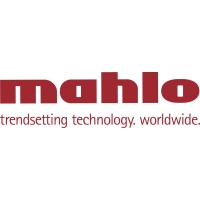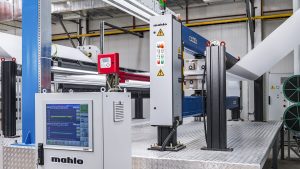 SAAL ON THE DANUBE, Germany — March 6, 2024 — Technical textiles have become essential across numerous industrial sectors. Mahlo GmbH + Co. KG, a leading provider of straightening and control technology, plays a crucial role in ensuring their flawless and efficient production. At the Techtexil held April 23-26 in Frankfurt, visitors can explore highlights from Mahlo’s diverse range of modular systems and pioneering solutions at Stand D55 in hall 12 during the exhibition.
SAAL ON THE DANUBE, Germany — March 6, 2024 — Technical textiles have become essential across numerous industrial sectors. Mahlo GmbH + Co. KG, a leading provider of straightening and control technology, plays a crucial role in ensuring their flawless and efficient production. At the Techtexil held April 23-26 in Frankfurt, visitors can explore highlights from Mahlo’s diverse range of modular systems and pioneering solutions at Stand D55 in hall 12 during the exhibition.
Efficiency and process reliability are the keys to sustainable production. Mahlo ensures this with its process control systems and established automatic straightening systems. At Techtextil, the machine manufacturer will be demonstrating how the production of technical textiles can be optimized with state-of-the-art weft straighteners and measurement and control technology.
Online process control in textile production processes is more important than ever before. “The continuous collection, analysis and preparation of the right data as well as the seamless transition of data flows are essential for the success of a company”, says Matthias Wulbeck, Product Manager QCS at Mahlo. With the broad portfolio of intelligent scanners and sensors, process parameters such as distortion, fabric temperature, dwell time, basis weight, coat weight, thickness, and many more can be recorded and controlled online.
Well suited for removing distortions in technical textiles is, among others, the automatic weft straightener Orthopac CRVMC-15, which is particularly interesting for the glass & carbon fabric industry and some special applications.

Another crucial tool is the versatile Qualiscan QMS quality measurement system. Up to five sensors traverse on robustly constructed measuring frames, continuously collect data and pass it on to the interfaces. Infrared technology is used as well as radioactive sources, laser, microwave and air permeability sensors. A special focus is placed on multi-channel measurements. These enable the manufacturer to calculate several measured values. For example, a single sensor with near-infrared or white-light interference technology can determine all components or layers of a product simultaneously. For the user, this results in significantly lower costs with high measuring accuracy. In addition, the lower space requirement and less assembly effort have a positive effect.
At the booth, skilled professionals will showcase measurements conducted on diverse fabric samples. These seasoned experts will be readily available to elucidate the optimal solution tailored to each customer’s specific needs.
Posted: March 6, 2024
Source: Mahlo GmbH + Co KG




